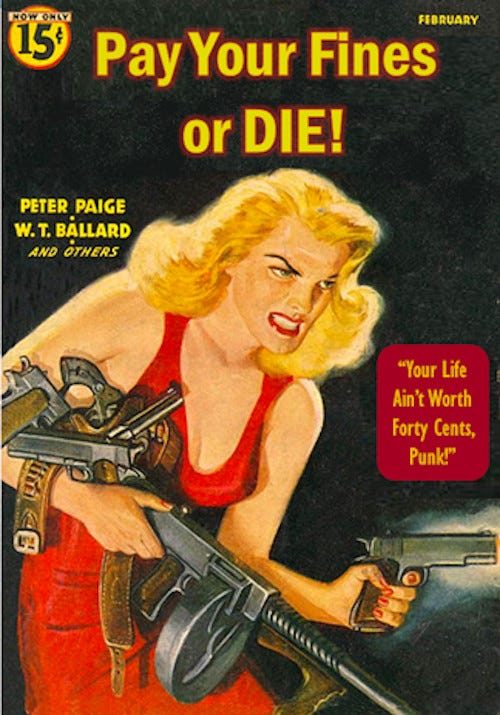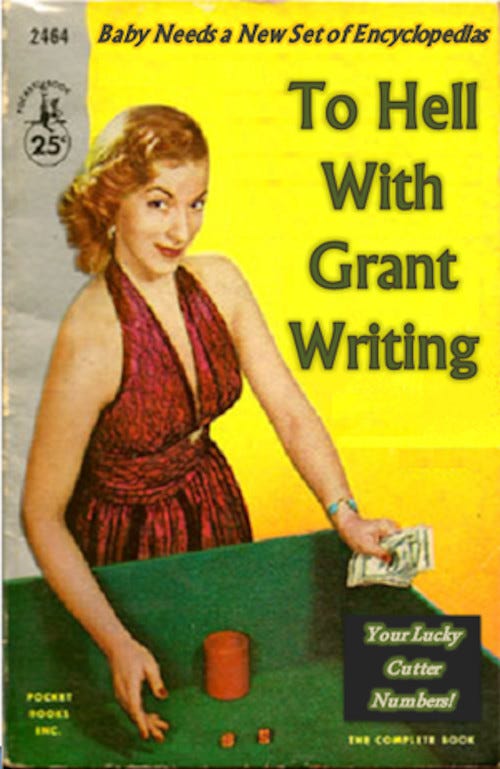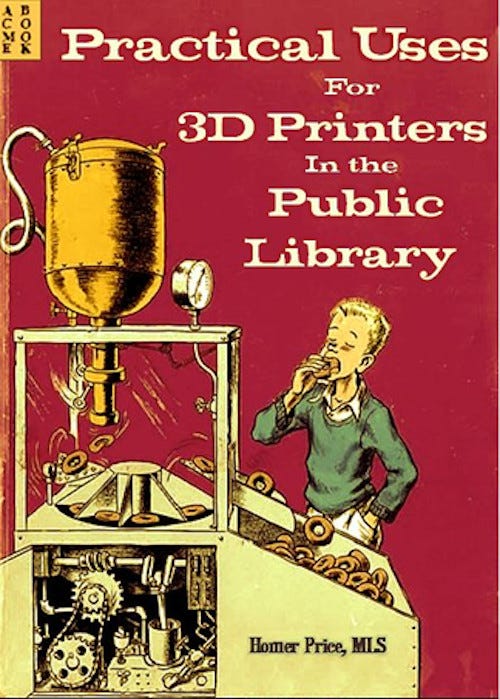Unread books. Plus: pulp fiction covers.
The "antilibrary." Umberto Eco's personal library. Notes on libraries and librarians and bookstores. And librarian's liberating "professional literature."
Read time: about 6 minutes, but you should linger on the pictures! This week: Books that are unread and that remain unread. And a real bonus — pulp fiction for librarians from Acme Upstairs Library School. Next week: Social media is changing.
Maybe you should subscribe?
The library is labyrinthine, as you would expect if you read his The Name of the Rose (a movie, too). He quickly navigates corridors and aisles, the camera following. There is a not-too-small chance that the labyrinth impression was intentional, given that the library is Umberto Eco’s. I wondered, how did he pay for the books? And the space? And what about keeping track of all the books?
About half-way through the brief video, another question pops into our minds: “Did he actually read all of them?”
Of course not. From a short post at Farnam Street: “A good library is filled with mostly unread books. That’s the point…. [W]e underestimate the value of what we don’t know and overvalue what we do know, we fundamentally misunderstand the likelihood of surprises.” The anonymous writer cites Nassim Taleb’s The Black Swan.
Taleb used Eco’s library (“containing thirty thousand books”) to illustrate the known and unknown, the read and the unread. “You will accumulate more knowledge and more books as you grow older, and the growing number of unread books on the shelves will look at you menacingly,” Taleb wrote. “Indeed, the more you know, the larger the rows of unread books. Let us call this collection of unread books an antilibrary.”
Serendipity and the visible, chattering unread
Sometimes events are serendipitous, and my regular morning reading routine (same websites, same magazines) delivers just the right message. I had planned this post for months, actually, and gathered links and thoughts, and then in the past few days some good reads appeared. On Sunday, The New Yorker delivered Max Norman’s “What We Gain from a Good Bookstore,” which I especially enjoyed for observations about browsing:
The good bookstore, [Jeff] Deutsch suggests, is what Gaston Bachelard called a “felicitous space,” whose real boundaries and character are much more than its physical dimensions, and whose purpose is more profound. It’s also the kind of institution, like a good bar or a good restaurant, that adds depth and substance to a community, but that, once lost, survives only in the winces and sighs of living memory.
(Deutsch heads up the Seminary Co-op Bookstores in Chicago, and is author of In Praise of Good Bookstores.)
The good bookstore uses misdirection and ambiguity, not for the sake of sales but for the sake of broadening a browser’s experience through serendipity. “The bookseller doesn’t have to use the Dewey decimal system or the Library of Congress classifications; the categories that are used to orient and gently disorient visitors can keep changing, creating new topographies in which browsers can get lost.” After listing some bookstores’ shelving categories (including the rather broad “Made-Up” and “True” used by Phinney Books in Seattle), Norman concludes, “You can use a bookstore to find a book you’re looking for, but, in a good one, you’re likely to discover something along the way.”
That discovery happens in libraries, too, despite librarians’ hyper-focused attention to “accurate” categorization that gives us a chance to “use” collections methodically. I’ve used libraries with closed and open stacks, and closed stacks were by far the least “useful” even though they were also exquisitely and transparently catalogued. Closed-stack libraries — where patrons request books but can’t visit bookshelves (“the stacks”) — make serendipitous discovery much, much harder.
The missing element in the closed-stack library? My wandering eye as I scan a shelf. My lostness as I try to find the right aisle where my targeted book resides. The unintentional treasure. The happened-upon title. The quick thumb-through. The book shelved right next door to the one I thought I wanted.
Serendipity is a friend of good scholarship. It blesses the wizened professor and the fresh student equally among unread books. I recall arriving on campus after the pandemic season receded enough to let campus reopen, though buildings remained locked and the library was guarded at the door. There, I ran into a library leader who specializes in copyright law and had guided many through Gordian permissions knots and open access for their work. He was also privy to discussions about reopening the libraries. “The library won’t be going closed stack, will it?” I asked at one point in our conversation. I was relieved when he said no. Scholarship, or at least serendipitous scholarship, had squeaked through again.
Unread books have a positive meaning, reminding us of what we do not yet know. Shelved within reach and yet so numerous as to be incomprehensible (in an old meaning of the word), they beckon. They teach us humility, gently and well.
Before we change over to the humor section, do you have a comment? How many books have you not read?
Fake pulp fiction covers from that seedy bookshop over there
While we’re on unread books, how about some books that are unread because they’re nonexistent? Well, they might have covers, and they have targeted an audience of librarians, though they appeal to all.
This is the kind of misinformation I can appreciate! As a matter of fact there is a whole series of “Miss Information.”
But I think that’s enough of that.
Everything is educational, too, since the covers are made available by the Acme Upstairs Library School (motto: Veni, Vidi, Verso). The school offers an extensive list of “professional literature for librarians,” apparently as a public service. A selection appears below, but you can see the whole list at the AULS’s website, all in the cheesily appealing pulp fiction mode!
It almost makes you want to get your Masters of Library Science.
There are scores of ’em at the Acme Upstairs Library School, and unfortunately the creator of the gems hides behind a pseudonym. All are “COPYRIGHT 2015 - LISAGENIUS - SO THERE.”
So, I guess, there you have it.
And, surely, you must have a comment?
Tags: library, book, literacy, thinking, ignorance, librarian, unread books, MLS, pulp fiction, parody, read
Get more independent writing. I recommend The Sample. They send one newsletter sample a day. No obligation. You can subscribe if you like it.
Links, cited and not, some just interesting
If you’re near Durham, North Carolina, here’s a good bookstore: The Regulator Bookshop, 720 Ninth Street. Incoming Duke students: you can walk to it easily, and you’ll be on Ninth Street or Broad Street anyway.
“So something that’s funny is that I actually don’t think I’ve read If You Give a Mouse a Cookie, but I have read … I have read Proust”: How to Draw All The Unread Books Weighing On Your Conscience. Accessed August 8, 2022. https://www.newyorker.com/video/watch/how-to-draw-all-the-unread-books-weighing-on-your-conscience. — Amy Kurzweil and Emma Allen talk about literary cartoons.
Perhaps by Shane Parrish? Farnam Street. “The Antilibrary: Why Unread Books Are The Most Important,” June 7, 2013. https://fs.blog/the-antilibrary/.
Norman reviews two books on bookstores. An enjoyable read. Norman, Max. “What We Gain from a Good Bookstore.” The New Yorker, August 6, 2022. https://www.newyorker.com/culture/cultural-comment/what-we-gain-from-a-good-bookstore.
This guy has tracked down some of the origins of the fake pulp fiction covers. Gertz, Stephen J. “The Shocking Hard-Boiled World Of Librarians!” Booktryst (blog). Accessed June 26, 2022. http://www.booktryst.com/2014/04/the-shocking-hard-boiled-world-of.html.














Great article. I'm working on a huge review round-up that will address some of this. In the meantime I mentioned this article in my own Substack: https://terryfreedman.substack.com/p/start-the-week-1
There's a bookshop not a million miles from where I live called Libreria, in which all the books are arranged by theme -- fiction, nonfiction, graphic novels, poetry etc all mixed up. It's to facilitate serendipity.
“Serendipity is a friend of good scholarship.”
I love this quote so much. The whole post, really, as it speaks so much to my relationship with bookstores and libraries. Rarely do I go in with purpose other than, “Find something.” The magic is in the unknown and what is yet to be discovered. Also about 15% of my home library is unread? Sigh.